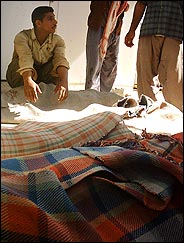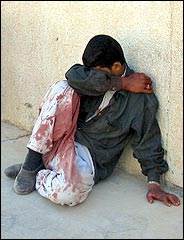Da The New York Times del 11/05/2005
Originale su http://www.nytimes.com/2005/05/11/international/middleeast/11cnd-iraq....
At Least 60 Are Killed in New Round of Attacks in Iraq
di John F. Burns, Terence Neilan
 BAGHDAD, Iraq - Insurgents struck in northern and central Iraq today in a series of attacks that killed at least 60 people in three cities, an Interior Ministry official said, intensifying their attempts to disrupt the newly formed Iraqi government.
BAGHDAD, Iraq - Insurgents struck in northern and central Iraq today in a series of attacks that killed at least 60 people in three cities, an Interior Ministry official said, intensifying their attempts to disrupt the newly formed Iraqi government.In the deadliest single attack, at least 30 people were killed and 60 were wounded when a suicide bomber detonated his vehicle in the main street of Tikrit, the hometown of Saddam Hussein, as casual workers gathered looking for jobs.
In the town of Hawija, near Kirkuk, about 150 miles north of Baghdad, a man wearing an explosives belt set it off as Iraqis looking to become national guards lined up at a recruitment center, the official said. Up to 30 people were killed and 45 were wounded.
Four attacks were carried out in Baghdad.
Two civilians were killed in the Doura neighborhood of southern Baghdad, when a car bomb detonated near a police station, the ministry official said. Six civilians were reported wounded.
Another two civilians, a man and a woman, were killed when a suicide car bomb exploded at 10:45 a.m. near a police patrol in the Yarmouk district of western Baghdad. Ten people, four of them policemen and the others civilians, were wounded, the Interior Ministry said.
Earlier, a roadside bomb aimed at a United States military convoy exploded in the Jamiah district of western Baghdad, wounding at least four civilians.
Insurgents also struck in New Baghdad, in the eastern part of the capital. An abandoned car that was parked on a crowded main street exploded at 8 a.m., wounding two civilians, the ministry official said.
On Tuesday, insurgents carried out two attacks in Baghdad. One was an attack on a passing American convoy that killed six Iraqis and wounded three American soldiers, the other a suicide bombing of a river patrol headquarters that wounded three policemen.
Today's round of attacks, which bring the death toll in the past two weeks to about 380, came as Marines continued their push into a region near the northwestern region near Syria in what they describe as an operation to eliminate insurgents from the area.
Three marines have died in the four days of the operation, and the number of insurgents and foreign fighters killed is estimated at 100, the Second Marine Division said in a statement today.
The continuing violence has included the most intensive sequence of suicide car bombings.
It follows the naming of a 55-member committee on Tuesday by Iraq's transitional national assembly to draft the country's permanent constitution, opening what promises to be one of the most contentious passages yet in the effort to build an Iraqi democracy.
With the committee established, the stage was set for a struggle over the nature of the future Iraqi state. A key issue will be the role of Islam and whether it will be politically decisive - as favored by many of the Shiite legislators who will have a slim majority - or marginalized in a secular system.
As assembly members skirmished over the committee's makeup inside the protective cocoon of Baghdad's Green Zone, insurgents who aim to cripple the country's political transformation struck again. On Monday they kidnapped the governor of Anbar Province and his son in an area near the northwestern border with Syria where Marine units paused on Tuesday after some of the heaviest fighting since the assault that captured Falluja in November.
The constitutional committee, like the assembly, will have a bare majority of 28 members from the Shiite alliance that won January's elections, with a core group drawn from two Iran-backed religious parties. They will be joined by 27 nominees from other groups with a strongly secular orientation. The secularists include two powerful Kurdish parties in the assembly, a group led by the outgoing prime minister, Ayad Allawi, and smaller, non-Shiite religious and ethnic groups, all with seats on the new committee.
Hussein Shahristani, speaker of the assembly, said the new constitutional committee will meet in coming days to choose a chairman and two vice-chairmen, posts that are expected to go respectively to a member of the governing Shiite alliance, a Kurd, and a member of Dr. Allawi's party. The committee will then have to adopt procedural rules, including a decision on whether its decisions will be made by majority vote, as favored by the Shiite alliance, or by a two-thirds majority, as sought by the Kurds and Dr. Allawi.
 Under the interim constitution adopted last year, the assembly is scheduled to adopt the constitution by Aug. 15, and submit it to a national referendum by Oct. 15, ahead of new elections in December for a full, five-year government.
Under the interim constitution adopted last year, the assembly is scheduled to adopt the constitution by Aug. 15, and submit it to a national referendum by Oct. 15, ahead of new elections in December for a full, five-year government.But with politicians on all sides predicting a protracted fight, particularly over the issue of Islam, the division of powers between the central government and the regions, and the allocation of oil revenues, many in Iraq believe the deadlines may slip, with the elections delayed until sometime later next year.
The kidnapping of the Anbar governor, Raja Nawaf Farhan al-Mahalawi, was confirmed at a briefing in Washington on Tuesday by Lt. Gen. James T. Conway, the Marine officer who is operations director for the Joint Chiefs of Staff. It occurred on Monday as he and his son drove from Qaim, the border town that anchors the area, to Ramadi, 80 miles west of Baghdad.
The general said reports reaching the Pentagon indicated that the governor's family were "engaged in discussion" with the kidnappers. They were identified in Iraqi news reports as members of a tribal group that supports Abu Musab al-Zarqawi, the Jordanian-born militant and Qaeda operative who has claimed responsibility for many of the most brutal insurgent attacks of the war.
The Associated Press reported that a man it named only as Hammad, said to be the governor's brother, had said the kidnappers "demanded that American forces leave Qaim in order to release him." At the Pentagon briefing, General Conway, who commanded the Marines in Anbar until his re-assignment to the Pentagon last year, was asked if the governor had asked for American military protection for his 200-mile journey back to Ramadi. "Not that I'm aware of," the general replied.
The governor's job in Anbar has been a tumultuous one, with a revolving door of appointees who have come under threat from the Sunni Arab insurgents who have made the province and its major cities and towns - Falluja, Ramadi, Haditha and Qaim, stretching northwest along the fertile banks of the Euphrates - into the war's deadliest fighting zone.
Last August, a previous American-appointed Anbar governor was forced into a humiliating resignation by insurgents who kidnapped his three sons, then forced the weeping official, on a videotape sold in Anbar marketplaces, to quit his job as the price of saving his sons from beheading.
Marine commanders in Anbar have said the purpose of the border offensive is to disrupt use of the region around Qaim to sustain the insurgency with the smuggling of cars, money, weapons and Arab volunteers from across the Middle East from Syria.
But General Conway offered a hint that one of the underlying objectives may be to capture or kill Mr. Zarqawi, who narrowly escaped capture by American troops near Ramadi in February, and has since been sighted, according to some Iraqi accounts, in Haditha.
When he was asked about Mr. Zarqawi, General Conway said there had been a reported sighting of Mr. Zarqawi "within the last three weeks" in the 100-mile stretch of the Euphrates between Haditha and Qusaiba, on the Syrian border. But he denied that the militant leader, who carries a $25 million American bounty, was a specific target of the offensive. "It would be a welcome event to come across him or his body and find him in that region, but that's not the purpose of the operation," he said.
The bombings in Baghdad today and on Tuesday continued a sequence of stepped-up attacks over the past two weeks that has accompanied the formation of the new Shiite-led transitional government, a historic watershed for Iraqis, who lived for generations under the political domination of the Sunni Arab minority until the toppling of Saddam Hussein.
The most common bombing targets have been American troops, American and other Western security contractors and the Iraqi Army and police units.
On Tuesday, a convoy of American armored vehicles on a joint patrol with Iraqis was struck when a parked car packed with explosives blew up on Sadoun street, in Baghdad's main commercial district. The 30 casualties, six of whom died, were mainly Iraqi civilians working and shopping nearby.
On Saturday, a suicide car bombing 300 yards farther up Sadoun Street killed 22 people, including two American security contractors.
John F. Burns reported from Baghdad for this article and Terence Neilan from New York. Richard A. Oppel Jr., Warzer Jaff and Abdul Razzaq al-Saiedy contributed reporting from Baghdad.
Sullo stesso argomento
Articoli in archivio
di Thomas E. Ricks su Panorama del 26/09/2006
su International Herald Tribune del 05/04/2006
News in archivio
su Corriere della Sera del 28/09/2006
Il 65% della popolazione irachena vive in stato di povertà
Iraq: la Caritas Iraq impegnata nell’assistenza di bambini e donne
Iraq: la Caritas Iraq impegnata nell’assistenza di bambini e donne
su Agenzia Fides del 29/03/2006
su SwissInfo del 26/03/2006
In biblioteca
di Abdullah Thabit A. J
EDT, 2008
EDT, 2008







